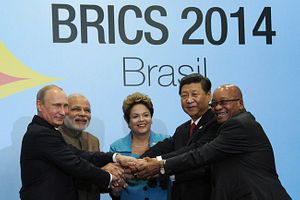A round-up of the best China-focused links from around the Internet:
The latest issue of China Monitor, from the Mercator Institute for China Studies (MERICS), digs into China’s “shadow foreign policy” (just in time for Halloween). The full piece is well worth a read-through. The main argument: China is developing a network of “parallel structures” to existing international organizations and institutions. The end goal is create an alternative reality for international engagement, so that China can expand its own influence while escaping the restrictions of the current U.S.-dominated system. However, the authors stress that China “is not seeking to demolish or exit from current international organizations… It is constructing supplementary – in part complementary, in part competitive – channels for shaping the international order beyond Western claims to leadership.”
China’s “shadow” network of alternative international structures encompasses everything from financial and economic partnerships (the Silk Road Economic Belt and the Asian Infrastructure Investment Bank) to full-blown political groupings like the Shanghai Cooperation Organization, Conference on Interaction and Confidence Building Measures in Asia (CICA), and BRICS.
In other news, yesterday, I described how China’s military is leading Beijing’s response to the Ebola epidemic in west Africa. Today, Reuters reports that the PLA plans to dispatch 480 medical staff to treat Ebola patients. According to Lin Songtian, the director general of the Department of African Affairs at China’s Foreign Ministry, it will be “the first time China has deployed a whole unit of epidemic prevention forces and military medical staff abroad.”
For a more detailed look at China’s response to Ebola, be sure to check out this report from Somatosphere .The report explores not just the official response (as presented in China’s state media) but the unofficial, grassroots narratives popping up on Chinese social media, as well as the perspective of Africans living in China. The piece is a fascinating look at how China’s official narrative of Sino-African friendship butts up against against xenophobia stemming from fear of infection. Many Chinese online are convinced it’s only a matter of time before the disease enters China – and that it will do so through China’s African expat community (largely centered in Guangzhou in southern China).
Two weeks ago, a clash between residents and construction workers in Yunnan province left eight dead as the villagers sought to prevent a forced eviction. In an update on that situation, the New York Times’ Sinosphere blog reports that 21 people (15 local residents and six workers at a construction firm) have been arrested in connection with the violence. In addition, the Kunming Commission for Discipline Inspection said it was investigating 16 officials for their role in the evictions and planned construction project. These officials have been suspended or removed from office while the investigation proceeds. The head of the local village committee has already been arrested for allegedly taking bribes.
Hong Kong student protest leader Joshua Wong wrote an op-ed for the New York Times this week entitled “Taking Back Hong Kong’s Future.” Wong writes that “the city [has] changed forever” since the protests began. In particular, he points to a major generation gap within Hong Kong.
“Earlier generations, many of whom came here from mainland China, wanted one thing: a stable life. A secure job was always more important than politics… The people of my generation want more. In a world where ideas and ideals flow freely, we want what everybody else in an advanced society seems to have: a say in our future.”
Wong also points out the potential consequences of this generational divide: “Hong Kong’s ruling class will eventually lose the hearts and minds of the people, and even the ability to govern, because they have lost a generation of youth.”
In case you missed it, Hong Kong Chief Executive CY Leung’s NYT October 8 letter to the editor can be found here. His main point? “Any suggestion that the Chinese government is ‘interfering’ in the current electoral reform debate is unfounded. Hong Kong’s future electoral, economic and social development is a natural and legitimate concern of our sovereign.”
Finally, in case you missed it, the Center for International Maritime Security (CIMSEC), in partnership with The Diplomat, presents a handy guide to the vocabulary being tossed around every time Asia’s maritime territorial disputes come up. From UNCLOS and ITLOS to EEZs and ADIZs, CIMSEC has you covered. Check it out to learn how to talk about the South China Sea disputes like a pro – or just to tell us what words and phrases you think should be included in the next round.

































